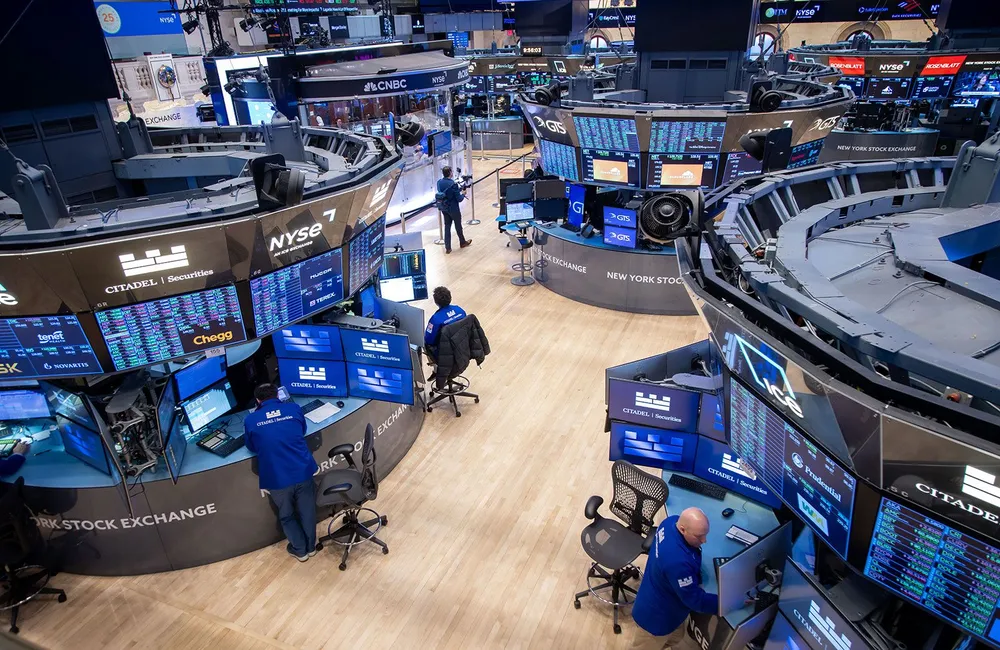Australian shares are crashing as markets around the world plunged after Russia escalated its conflict with Ukraine by sending military operations into that country.
Ukraine claims its larger neighbour has launched a full-scale invasion by attacking cities with weapons strikes, and that Russian soldiers had landed in the Ukrainian port cities of Odessa and Mariupol.
The benchmark S&P/ASX200 index fell 215.1 points, or 2.99 per cent, to 6990.6 points on Thursday.
That meant new investors were $68 billion in market value down by the end of the tumultuous session, with the index at one point falling 3.4 percent.
The All Ordinaries index fell 220.8 points, or 2.95 per cent, to 7253.1 points.
“We were seeing a market sell-off fairly quickly in reaction to the Russian military activity. It was a broad moves risk-off event where money moved out of stocks into safe-havens like the US dollar, and bond futures,” CommSec market analyst Tom Piotrowski said.
The news triggered a flight to safety that reverberated throughout the world markets. US futures tumbled, with the S & amp; P 500 and Dow Jones Industrial down 2.2% and the Nasdaq 100 down 2.9%. The pan-European Stoxx 600 index fell 4.2 percent before markets opened.
The Shanghai Composite in China was 1.7% lower and Hong Kong’s Hang Seng was down 3.5% in late-afternoon trading. Japan’s Nikkei was down 1.8% at 3pm in Tokyo.
Investors fled to safe haven assets such as government debt and gold. The 10-Year US government Treasury note also surged, driving down yields to 1.89%, compared with a close of 1.99%. Gold futures surged 1.7% to US$1943.70.
All local market sectoral indices closed deep in the red, but the biggest hits were taken by technology, mining and consumer discretionary stocks.
Heavy mining shares fell on fears for demand for iron ore in China. BHP shares were the biggest laggards in the pack, down more than 6.5 per cent, with sentiment also hit as the stock turned ex-dividend.
Rival Rio Tinto (RIO.AX) closed down 3.8% at $115.35 after flagging higher costs in its full-year results released late on Wednesday. The world’s largest iron ore producer said it made its highest annual profit and dividend in history, but also warned it would see a rise in Pilbara iron ore costs as labour shortages in Western Australia bit.
Fortescue Metals fell more than 4 per cent.
Energy stocks tumbled, then regained some ground late in the session after oil prices topped $US100 a barrel for the first time since 2014 amid possible supply issues.
Woodside finished 2.7 per cent lower at $28.08, and Santos fell 0.4 per cent to $7.10.
“We’re going to see elevated energy prices for some time to come and that’s going to feed through to inflationary pressures. That’s a difficult environment for the equities market,” Mr Piotrowski said.
Technology shares, already having corrected on expectations of rising interest rates, dropped further on the geopolitical turmoil. The sector index now sits at its lowest levels since June 2020, driven by a 13 per cent plunge in payments company Block, a 7.5 per cent decline in Wisetech Global, and a 5.5 per cent drop in Xero.
Qantas lost more than five per cent, falling to $5.08, after the national carrier of Australia widened its half-year loss and predicted a $650 million hit to second-half earnings from Omicron.
The Big Four banks ended between 2 percent and 3.5 percent lower. And among consumer discretionary stocks, heavy losses for Flight Centre and Webjet, plus Domino's Pizza, weighed down.
In defiance, CIMIC Group shares surged almost 33.4 per cent to $22 after the top shareholder of the Australian construction company, Hochtief, announced a $1.47 billion proposal to buy out the remaining 21.4 per cent stake.
The Australian dollar fell on souring risk sentiment after the Russian decision. At 1700 AEDT the local unit was trading at 71.95 US cents, down from 72.33 US cents at Wednesday's close.
ON THE ASX
The S&P/ASX200 benchmark index was 215.1 points, or 2.99 per cent, lower at 6990.6 points at the close on Thursday.
The All Ordinaries index fell 220.8 points, or 2.95 per cent, to 7253.1 points.
SPI200 futures index was flat at 6944 points at 1700 AEDT.





















